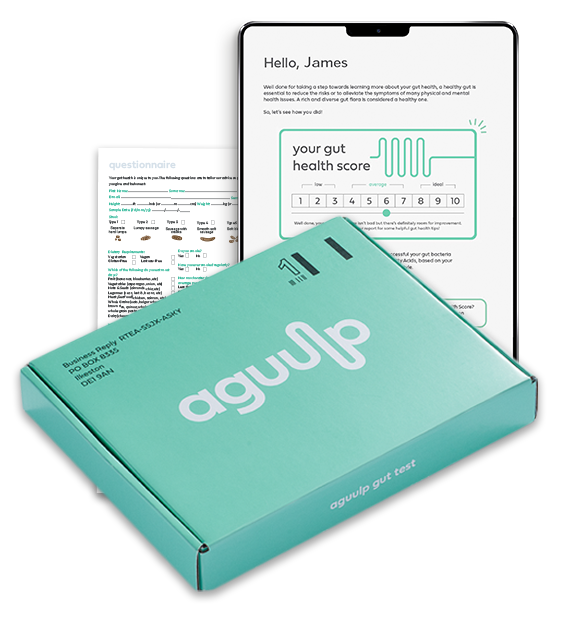The Gut Health Test Explained

Our easy, at-home gut health test kit is a great way to gain a better understanding of what’s going on inside, along with personal recommendations on how to optimise your gut health via diet, lifestyle and supplementation improvements.
Read on to learn more about how it works, what it measures, what your results might mean and why.
Why take a gut health test?
Here at Aguulp, we believe good health starts in your gut, it’s home to trillions of bacteria that can directly impact your digestive health, immune system, mental health and more. Did you know that 90% of serotonin (the happy hormone) is produced in our gut cells with the help of our gut bacteria? Or that 70% of your immune system lives in your digestive tract?
By learning about our gut health and how to improve it, we can start to improve our overall health and wellbeing.

How it works – 5 easy steps
- Fill out your diet & lifestyle survey
- Take a small stool sample as per the instructions in your gut health kit – we know this might sound daunting, but we promise you it’s very straight forward and with the tools provided in your kit it’s hygienic too.
- Post your stool sample to our lab with the ready made label enclosed in the kit
- Receive your personalised gut health report via email
- Follow the recommendations and optimise your gut health!
What your report includes
- Your overall gut health score
- SCFAs analysis and insights into your gut’s bacterial balance
- Stool consistency analysis and evaluation
- Tailored advice and recommendations on how improve your diet and lifestyle
Analysing your gut health
Determining how healthy your microbiome is, depends on two main factors:
- Diversity – this implies how many species of good bacteria you have. The more diversity you have, the healthier your microbiome is. That’s because individual bacteria species have specific beneficial roles to play.
-
Abundance – this implies how many you’ve got. The higher the quantity of good bacteria you have, the healthier your microbiome is. The good bacteria help to maintain the health of our body in many ways (stimulate our immune system, produce healthy products (like Short-Chain Fatty Acids) and, suppress the growth of bad bacteria.
To gain insight into your microbiota’s diversity and abundance we measure your SCFAs…
Your stool sample allows us to measure your key biomarkers known as short-chain fatty acids. The quantity of SCFAs produced by your gut depends on your gut microbiota’s balance of certain bacterial species as well as your diet composition.
Analysing your SCFAs gives us an insight into your bacterial diversity, an understanding of your diet and a snapshot of your current gut health.
The three main SCFAs we look out for are Acetate, Butyrate and Propionate. In the report we break down what these SCFAs do and how you can fuel your good gut bacteria to make more of them.
Understanding your results
In your report you’ll get an overall gut health score, this will range between 1-10. If your gut health score is equal to ten, it means your gut produces plenty of SCFAs and that you likely have a great proportion of healthy and diverse bacterial species.
The lower the score, means the lower the amount of SCFAs detected, this indicates a lower proportion of healthy and diverse bacterial species.
The survey you complete alongside your gut test also helps us give you further advice. You’ll get a ‘low, average or high’ on each of the following aspects of your diet and lifestyle along with recommendations on how to improve them:
- Diet diversity
- Pre + Probiotic supplementation
- Fuel for bad bacteria
- Hydration
- Fasting
- Smoking
- Alcohol
- Exercise
- Sleep
Further support
Our in-house nutritionist will also be available to answer any further questions you have after your test.
If you don’t get the score you had hoped for, don’t be disheartened…
There are many contributing factors that can impact your score, from diet and exercise, to sleep, stress, travel and medication. Even how you were born (through vaginal delivery or Cesarean) as well as how you were first fed (formula or breast milk) has an impact.
In fact, the first three years of our lives are very important, coined the ‘window of opportunity’ the microbes you encounter within this time period will set the playing field for your adult gut health, meaning some people, by no fault of their own, have a less diverse gut composition than others.
And remember, even with supplementation, making a significant change to your microbiota takes time, The British Society of Gastroenterology recommends that probiotics should be taken for at least 12 weeks to see optimal results so perseverance is important.